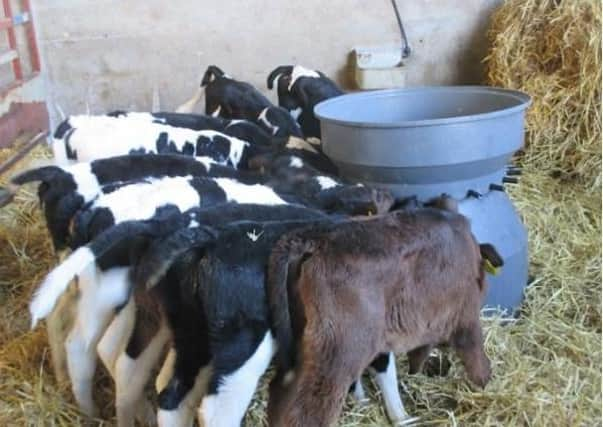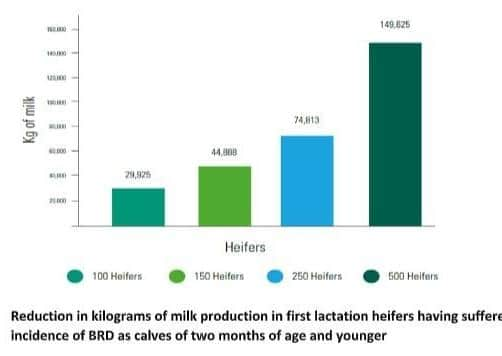Act in time to control pneumonia


It is the single biggest cause of sickness and death in all ages of cattle greater than a month of age.
It accounts for approximately one third of deaths in calves and weanlings. Neonates (calves less than one month of age) are also affected; after diarrhoea and septicaemia, BRD accounts for 11% of losses in this age group. We know how serious an issue respiratory disease is in young stock and yet alarmingly only 25% of this susceptible age group are currently vaccinated. Why is this?
Advertisement
Advertisement
Vaccination early in a calf’s life can play an integral part in keeping the present and future impact of BRD to a minimum. However, vaccination alone cannot carry the responsibility for disease control.


Management of the environment, nutrition, husbandry practices and control of other diseases all contribute to immune competence of the calf whilst keeping stress and the challenge of infection to a realistic level.
The benefits of early calf vaccination
Pre-weaning growth rates were found to decrease by eight per cent for calves experiencing pneumonia and by up to 29% for calves affected by both diarrhoea and pneumonia. “Sick days” for calves have a life-long effect on their efficiency and productivity. Each sick day for a dairy heifer calf can result in her producing 120kg less milk in her first lactation.
Herd immunity
When implementing a vaccination programme, it is important to vaccinate healthy animals and to complete vaccination before the risk or stress periods. For young calves this means the earlier the better, for weanlings vaccination should be complete prior to weaning and housing. When it comes to vaccination, group immunity is everything. All calves should be vaccinated, not merely for the benefit of that individual calf but for the benefit of the whole group.
Reducing subclinical disease
Advertisement
Advertisement
So often the sick animals we see and treat for pneumonia are only the tip of the iceberg when it comes to the actual extent of the problem on a farm. How common is subclinical disease? The prevalence is essentially unknown and varies from farm to farm but is thought to affect 23-67% of animals.
The impact of subclinical disease is well documented. From a dairy heifer perspective, the presence of a small lung lesion in the first eight weeks of life can result in a decrease of 525 kg in milk production in a 305-day first lactation.
In terms of beef production, calves who have encountered BRD have a decreased growth performance (-61 to -108 grams per day) and a longer finishing period (+33 days), when compared to calves without a BRD history.
Reduction in antimicrobial usage
By addressing husbandry issues (such as inadequate ventilation in sheds) and by implementing vaccination programmes we can improve calf health and welfare whilst reducing the amount of antibiotics we need to use.
Acceptable welfare standards
Advertisement
Advertisement
Good health (free from pain, injury and disease) is necessary for an acceptable standard of welfare. Welfare and care standards are everyone’s responsibility and also fundamental for social acceptability.
Speak to your vet regarding your vaccination protocol. Every herd comes up against different disease challenges in the year and recognising these individual farm “danger points” will help determine which vaccine or vaccines are right for you and the best time to give them for most benefit.
MSD Animal Health’s range of pneumonia vaccines for early calf vaccination
* Bovilis Bovipast RSP
* Bovilis INtranasal RSP Live
* Bovilis IBR Marker Live
MSD Animal Health emphasise the importance of choice when it comes to deciding on the correct vaccine to be administered at the right timing for individual farm vaccination programmes.
Advertisement
Advertisement
As a sector we must benefit from the feed efficiency of early life. We need to focus our attention to reduce the disease challenge to young calves and to ensure they receive adequate immunity via colostrum feeding and through vaccination. This will allow us to improve productivity, decrease antimicrobial usage, decrease losses and improve animal welfare.